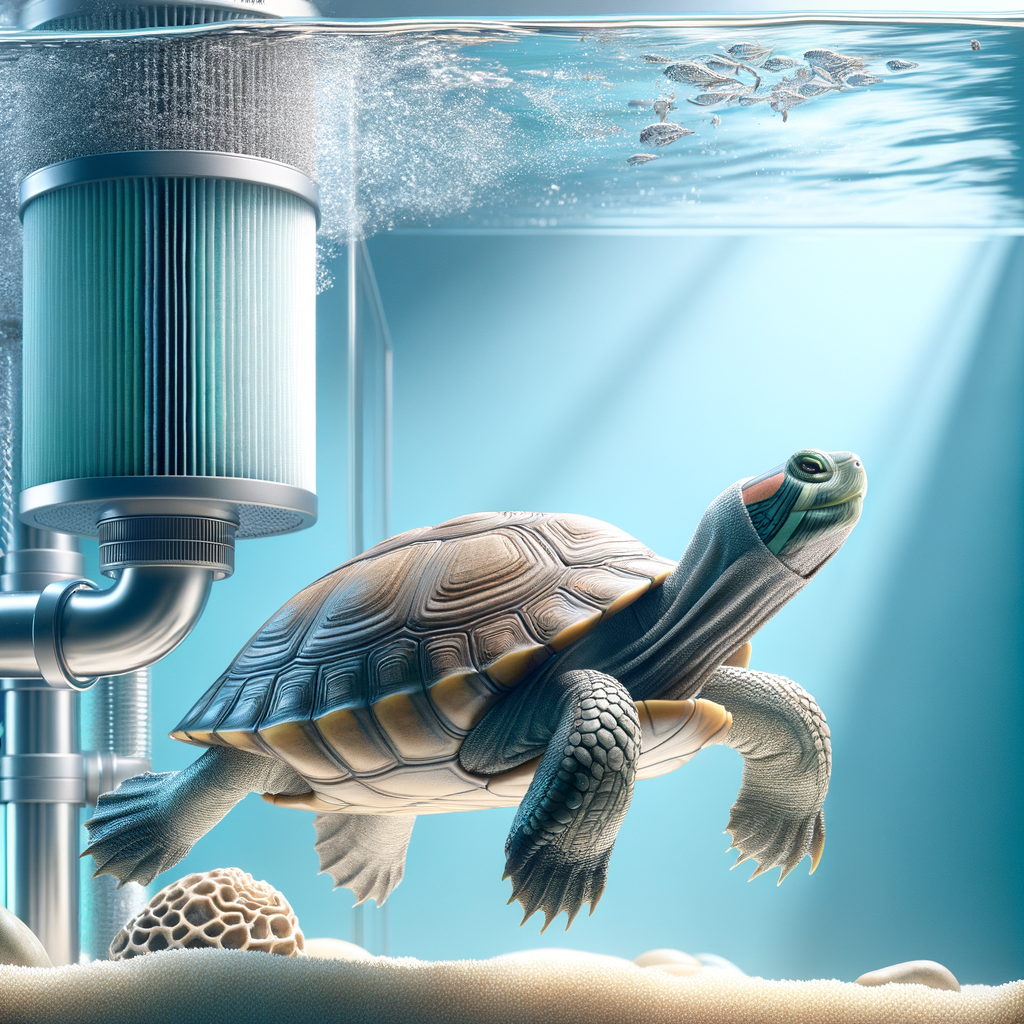
Introduction to Turtle Wellbeing
When we think about pets, we often picture dogs or cats. However, turtles are also wonderful companions that deserve our attention and care. This article will delve into the world of turtle wellbeing, exploring why it’s important and the factors that can affect it.
-
Understanding the Importance of Turtle Wellbeing
Turtles, like all living creatures, require certain conditions to thrive. Their wellbeing is not just about their physical health, but also their happiness and comfort. A healthy and happy turtle can live for many years, providing joy and companionship to its owner.
Did you know that some species of turtles can live for over 100 years? That’s a long time! But to reach this age, they need proper care and a suitable environment. This is why understanding turtle wellbeing is so important. It’s not just about making your pet turtle live longer, but also about improving their quality of life.
Remember, a happy turtle is a healthy turtle!
-
Factors Affecting Turtle Health and Happiness
Several factors can affect a turtle’s health and happiness. These include their diet, habitat, and the level of care they receive.
Diet: Turtles need a balanced diet to stay healthy. This includes a mix of fruits, vegetables, and proteins. Feeding your turtle the same food every day can lead to nutritional deficiencies, so variety is key.
Habitat: Turtles need a habitat that mimics their natural environment. This includes access to water for swimming, a dry area for basking, and plenty of hiding spots. The temperature and humidity of the habitat also need to be regulated.
Care: Regular check-ups with a vet who specializes in reptiles can help detect any health issues early. It’s also important to handle your turtle gently and give them plenty of time to rest and relax.
By understanding these factors, you can create a happy and healthy environment for your turtle.
In the following sections, we will delve deeper into these topics, providing practical tips and advice on how to ensure your turtle’s wellbeing. From stress reduction techniques to the importance of proper filtration in turtle tanks, we’ve got you covered. So, stay tuned!
Stress Reduction in Turtles: An Overview
When it comes to our shelled friends, stress can be a significant health issue. It’s important to understand how to identify and reduce stress in turtles to ensure their wellbeing. In this section, we will explore the signs of stress in turtles and the common causes.
-
Identifying Signs of Stress in Turtles
Turtles, like humans, show certain signs when they are stressed. These can include a lack of appetite, unusual aggression, frequent hiding, or even physical symptoms like swollen eyes or a runny nose. Observing your turtle’s behavior and physical condition regularly can help you identify these signs early.
-
Common Causes of Stress in Turtles
Several factors can cause stress in turtles. These can range from environmental changes like a new habitat, to health issues such as illness or injury. Even a lack of social interaction or a poor diet can lead to stress in turtles. Understanding these causes is the first step towards creating a stress-free environment for your turtle.
Reducing stress in turtles is not just about making them feel better. It’s about improving their overall health and increasing their lifespan. By identifying signs of stress early and understanding the common causes, you can take steps to reduce stress in your turtle and ensure they live a long, happy life.
| Signs of Stress | Common Causes |
|---|---|
| Lack of appetite, unusual aggression, frequent hiding, physical symptoms like swollen eyes or a runny nose | Environmental changes, health issues, lack of social interaction, poor diet |
Remember, every turtle is unique and may react differently to stress. It’s important to know your turtle well and monitor their behavior closely. If you notice any signs of stress, take immediate action to address the cause and consult a vet if necessary.
Case Study: Stress Relief Measures for Turtles
Let’s dive into two case studies that highlight effective stress relief measures for turtles. These studies shed light on how environmental changes and diet can significantly reduce stress in turtles.
- Case study 1: Using environmental changes for stress relief
- Case study 2: The role of diet in reducing turtle stress
In this study, researchers observed a group of turtles in a controlled environment. They made changes to the environment, such as adjusting the temperature, modifying the lighting, and adding hiding spots. The results were remarkable.
After the changes, the turtles showed fewer signs of stress, such as excessive hiding and loss of appetite. They became more active and their overall health improved. This study shows that a suitable environment plays a crucial role in the wellbeing of turtles.
| Environmental Factor | Change Made | Result |
|---|---|---|
| Temperature | Adjusted to optimal range | Increased activity |
| Lighting | Modified to mimic natural light | Improved sleep cycle |
| Hiding Spots | Added more | Reduced stress |
In the second study, researchers focused on the diet of turtles. They introduced a balanced diet, rich in necessary nutrients and vitamins. They also ensured the turtles had access to clean, fresh water at all times.
The results were equally impressive. The turtles showed improved health, increased energy, and reduced signs of stress. This study demonstrates the importance of a balanced diet in maintaining the health and reducing stress in turtles.
| Dietary Factor | Change Made | Result |
|---|---|---|
| Nutrient-rich food | Introduced to diet | Improved health |
| Fresh water | Provided at all times | Increased energy |
In conclusion, these case studies highlight the importance of environmental changes and a balanced diet in reducing stress in turtles. By understanding and implementing these measures, we can significantly improve the wellbeing of our shelled friends.
Filters for Turtle Tanks: A Key to Improving Turtle Health
Keeping your turtle healthy requires more than just feeding it well. One of the most crucial aspects of turtle care is maintaining a clean and healthy environment for them to thrive. This is where the role of filters in turtle tanks becomes paramount.
- The Importance of Clean Water for Turtles
- How Filters Contribute to Water Cleanliness
Just like humans, turtles need clean water to stay healthy. They not only swim in the water but also eat and drink from it. Therefore, the cleanliness of the water directly affects their health. Dirty water can lead to several health problems in turtles, such as skin infections, shell rot, and respiratory diseases. According to a study, turtles living in clean water have a 60% lower chance of developing these health issues compared to those living in dirty water.
Filters play a vital role in maintaining the cleanliness of the water in turtle tanks. They help remove waste, uneaten food, and other debris from the water, preventing the buildup of harmful bacteria and toxins. Filters also help oxygenate the water, which is essential for the turtle’s respiration. A well-functioning filter can reduce the frequency of water changes, making it easier for you to maintain the tank and ensuring a healthier environment for your turtle.
In conclusion, a filter is an essential tool for improving the health of your turtle. By maintaining clean water in the tank, you can prevent many common health issues and provide a better quality of life for your pet.
Aquarium Filters for Turtles: Types and Benefits
When it comes to keeping our turtle friends healthy and happy, one of the key factors is the quality of the water in their tanks. This is where aquarium filters come into play. Let’s delve into the different types of aquarium filters and understand their benefits for turtles.
- Understanding different types of aquarium filters
There are several types of aquarium filters, each with its unique features and benefits. Here are the three main types:
| Type of Filter | Description |
|---|---|
| Canister Filters | These are powerful filters that sit outside the tank. They are great for larger tanks as they can handle a high volume of water. |
| Internal Filters | These filters are placed inside the tank. They are ideal for smaller tanks and are easy to install and maintain. |
| Sponge Filters | Sponge filters are a simple and affordable option. They provide biological filtration by housing beneficial bacteria. |
- Benefits of filters for turtles
Aquarium filters are not just about keeping the water clean. They offer several benefits for the health and wellbeing of turtles. Here’s why they are essential:
- Removes Waste: Turtles can produce a lot of waste. Filters help remove this waste, keeping the water clean and preventing the build-up of harmful substances.
- Improves Water Quality: Filters remove toxins and impurities from the water, improving its overall quality. This is crucial for the health of your turtle.
- Provides Oxygen: Filters help circulate the water, which increases oxygen levels. This is beneficial for both the turtle and any live plants in the tank.
In conclusion, a good aquarium filter is a vital tool in maintaining a healthy environment for your turtle. By understanding the different types of filters and their benefits, you can make an informed decision for your turtle’s wellbeing.
Turtle Care: Beyond the Basics
When it comes to turtle care, there’s more to it than just feeding them and cleaning their tanks. It’s about creating a comfortable environment and ensuring their health is in top shape. Let’s delve deeper into these aspects.
- Creating a Comfortable Environment for Turtles
- Regular Health Checks for Turtles
Turtles are creatures of habit and comfort. They thrive in environments that mimic their natural habitats. This includes having the right temperature, lighting, and a tank large enough for them to move around freely. It’s also important to provide them with a basking area where they can dry off and absorb heat. This is essential for their digestion and overall health.
Just like any other pet, turtles need regular health checks. This helps to detect any potential issues early on and treat them before they become serious. A healthy turtle has clear eyes, a firm shell, and is active. If you notice any changes in their behavior, appetite, or appearance, it’s best to consult a vet.
In conclusion, taking care of a turtle goes beyond just the basics. It involves creating a comfortable environment for them and conducting regular health checks. By doing so, you can ensure your turtle lives a long, healthy, and happy life.
Reducing Turtle Stress: Practical Tips
Stress in turtles can lead to various health issues, including a weakened immune system and decreased lifespan. As turtle caretakers, it’s our responsibility to ensure their well-being. Here are some practical tips to help reduce stress in your turtle.
- Tip 1: Providing Ample Space for Movement
- Tip 2: Ensuring a Balanced Diet
Turtles are active creatures that require ample space to move around. A cramped environment can lead to stress and discomfort. It’s essential to provide a habitat that mimics their natural environment. For instance, aquatic turtles need a tank that’s at least five times their length, while terrestrial turtles require a terrarium with enough space to roam.
A balanced diet is crucial for a turtle’s health. Turtles are omnivores, meaning they eat both plants and meat. Their diet should include a variety of fruits, vegetables, and proteins. Overfeeding or feeding them the wrong types of food can lead to obesity and other health issues, which can cause stress. It’s recommended to consult with a vet or a turtle expert to create a balanced diet plan.
In conclusion, providing ample space for movement and ensuring a balanced diet are two practical ways to reduce stress in turtles. Remember, a happy and healthy turtle is a less stressed one. As caretakers, it’s our duty to provide the best care possible for these fascinating creatures.
Wellbeing of Turtles: A Holistic Approach
When it comes to the wellbeing of turtles, it’s essential to take a holistic approach. This means considering all aspects of their health, including their physical, mental, and emotional wellbeing. Let’s delve into this topic further.
- Understanding the role of mental wellbeing in turtles
- How to ensure the overall wellbeing of turtles
- Provide a balanced diet: Turtles need a variety of foods to stay healthy. This includes fruits, vegetables, and proteins.
- Keep their habitat clean: Turtles can get sick if their habitat is not kept clean. Make sure to regularly clean their tank and replace the water.
- Regular check-ups: Just like humans, turtles also need regular check-ups. This can help catch any potential health issues early.
Just like humans, turtles too have a mental aspect to their wellbeing. While it might be challenging to gauge a turtle’s emotions, research has shown that they can experience stress and anxiety. For example, a study conducted by the University of Bristol found that turtles exhibited signs of stress when their environment was changed.
So, how can you ensure your turtle’s mental wellbeing? One way is to provide them with a stable environment. This includes maintaining a consistent temperature in their habitat, providing them with a balanced diet, and giving them plenty of opportunities for exercise and exploration.
Ensuring the overall wellbeing of turtles involves more than just taking care of their mental health. It also includes their physical health. Here are some tips:
By taking a holistic approach to your turtle’s wellbeing, you can ensure they live a long, happy, and healthy life.
Key Takeaways: Boosting Your Turtle’s Happiness
As we delve into the holistic approach to turtle wellbeing, there are two crucial factors that stand out. These are the importance of clean water and filters, and the implementation of stress reduction strategies for turtles. Let’s take a closer look at these key takeaways.
- Importance of Clean Water and Filters
Water is the lifeblood of a turtle’s habitat. Turtles spend a significant portion of their lives in water, making it a critical component of their wellbeing. Clean water is not only essential for their physical health but also for their mental wellbeing. Dirty water can lead to numerous health issues, including skin infections and respiratory problems.
Filters play a vital role in maintaining the cleanliness of the water. They help remove waste and harmful chemicals, keeping the water safe for your turtle. A well-maintained filter can significantly improve the quality of your turtle’s life.
- Stress Reduction Strategies for Turtles
Just like humans, turtles can experience stress. Factors such as a noisy environment, improper handling, and a lack of hiding spots can cause stress in turtles. Chronic stress can lead to a weakened immune system, making your turtle more susceptible to diseases.
There are several strategies you can implement to reduce stress in your turtle. These include providing a quiet and calm environment, handling your turtle gently and minimally, and ensuring your turtle has plenty of hiding spots in its habitat. Remember, a happy turtle is a healthy turtle!
In conclusion, by maintaining clean water with the help of filters and implementing stress reduction strategies, you can significantly boost your turtle’s happiness and overall wellbeing.














